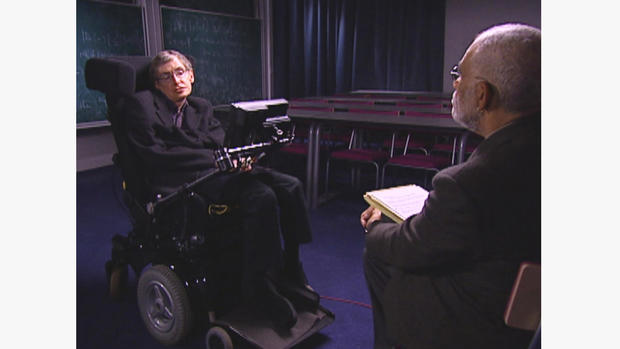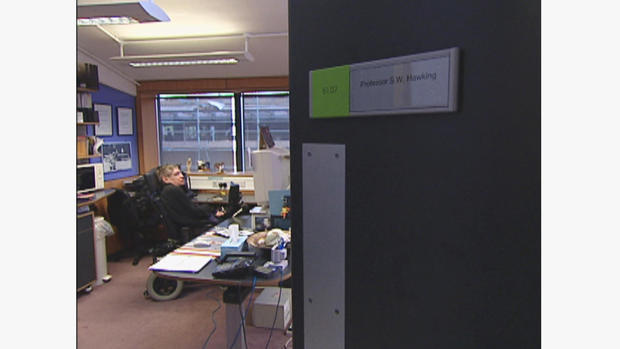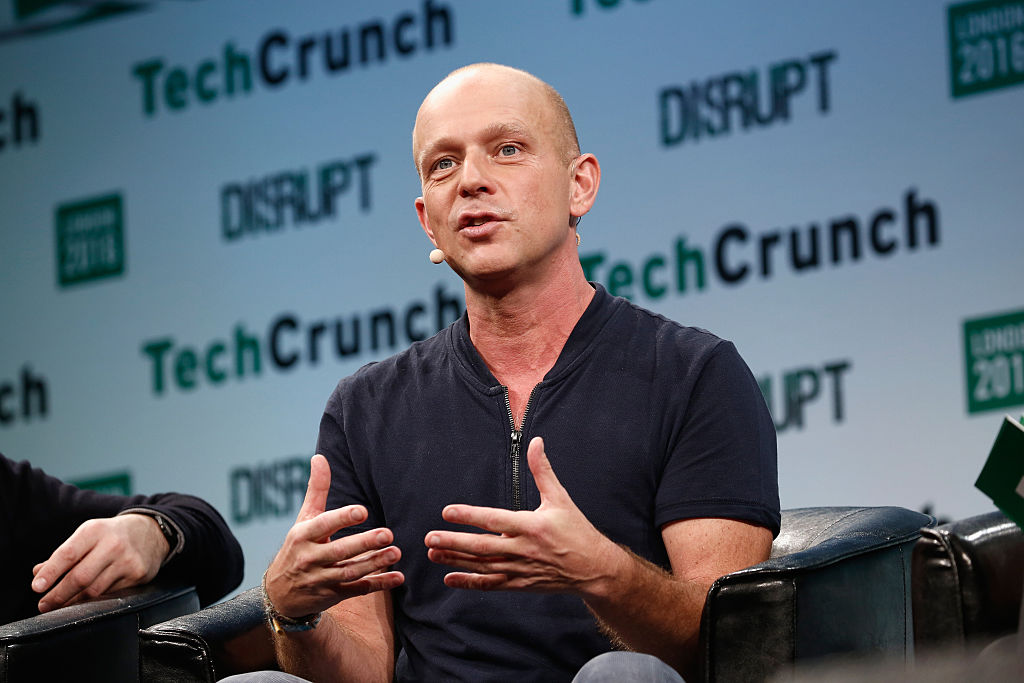Stephen Hawking: The 60 Minutes interview
Stephen Hawking, a brilliant theoretical physicist whose ability to overcome a debilitating disease was as big a mystery as some of the enigmas of the cosmos, died Wednesday at age 76. In January 2003, Ed Bradley interviewed him for 60 Minutes on the occasion of Hawking's 60th birthday—a true milestone for a man who had, to that point, cheated death for nearly four decades.
In the interview, Bradley asked Hawking about love, comparing him to Einstein (on whose birthday he died), and whether there was room for a God in his universe.
"I use God as a metaphor for the laws that govern the universe," Hawking told Bradley. "So when I say we will know the mind of God, I immediately will understand the universe completely."
The following is a script of "Stephen Hawking," which aired on January 5, 2003:
Ed Bradley: What you're about to see is not the easiest story to look at that we've ever shown you, but it could be as fascinating a one as you have ever seen anywhere. How Professor Stephen Hawking, a world-renowned physicist who some compare to Albert Einstein, has successfully dealt for 40 years with ALS, Lou Gehrig's disease, is to some as big a mystery as the mysteries of the universe that he has so successfully dealt with to become, among other things, a folk hero to his fellow academics at Cambridge University.
It was a party that no one ever expected to attend. For nearly 40 years, Professor Stephen Hawking has cheated death. At the age of 21, he was given just two years to live. He'd been diagnosed with ALS, or Lou Gehrig's disease, a progressive degenerative disease which attacks the central nervous system. Hawking's 60th birthday party was held at Cambridge University, where he was surrounded by his family, his students and cosmologists from all over the world who had flown in to honor one of the most famous living scientists.
What was going through your mind at those celebrations?
Professor Stephen Hawking: (Through voice synthesizer) For many people, 60 is an unwelcome milestone, but for me it is quite an achievement. I never thought I would get so far.
Ed Bradley: Hawking can communicate only through a voice synthesizer attached to a computer. By clicking a switch with the little movement he has left in his fingers, he chooses words and builds up sentences on the computer screen. It is a time-consuming process, so we gave him most of our questions in advance so that he could program his answers in the computer, although as Joan Goodwin, one of a team of nurses who accompanies him everywhere, explained, some set phrases are preprogrammed.
Joan Goodwin: And things like 'Good night' and 'Goodbye' and...
Stephen Hawking: (Through voice synthesizer) Hello.
Ed Bradley: Hello.
Stephen Hawking: (Through voice synthesizer) How are you?
Ed Bradley: I'm fine. And--and is Professor Hawking very demanding?
Joan Goodwin: He's quite demanding, yes.
Ed Bradley: But with a smile?
Joan Goodwin: But with a smile, yes.
Stephen Hawking: (Through voice synthesizer) Yes.
Joan Goodwin: I'm using the word 'quite' in the American sense.
Ed Bradley: Which means...
Joan Goodwin: Which means a lot, doesn't it?
Ed Bradley: A lot.
Joan Goodwin: Yes.
Ed Bradley: Yeah.
Joan Goodwin: Whereas in the English sense, it means the opposite.
Ed Bradley: It's the opposite. So he is demanding.
Joan Goodwin: But...
Ed Bradley: Is that right, Professor?
Stephen Hawking: (Through voice synthesizer) I would prefer to say I was determined. If I hadn't been thoroughly determined, I wouldn't be here now.
Ed Bradley: Stephen Hawking was born the eldest child of a medical scientist and, at the age of 17, went to Oxford to study physics. Just how effortlessly brilliant he was soon became apparent to his fellow students. Derek Powney, who today is a Catholic priest, remembers when the class was given 12 particularly tough questions to be completed in a week.
And two of you together had done one and a half.
Father Derek Powney: And one of us alone had done one. And we'd been working on it all week. Stephen, of course, hadn't started them, because Stephen never did bother to do anything until the last minute, or not at all.
Ed Bradley: Powney says on the morning the work was due to be handed in, Hawking finally put his mind to the questions.
Father Derek Powney: "Well, Hawking," I said, "how many have you done, then?" "Well," he said, "I've only had time to do the first 10." And I think at that point we understood that Stephen wasn't just not in the same town as we were—he wasn't on the same planet.
Ed Bradley: But Hawking was about to fall back to Earth. Having graduated from Oxford with first class honors, he moved to Cambridge to study for a postgraduate degree. His mother Isabel remembers him returning home to the small town of St. Albans for Christmas.
Isabel Hawking: It was a very cold year, so we went skating on the lake at St. Albans, and he fell down and couldn't get up. So we went and had coffee, and then he told me--which he hadn't, you see--he ha--he had been aware of this coming on, but he didn't know what it was, of course, but he hadn't passed it on. We didn't know.
Stephen Hawking: (Through voice synthesizer) It was a great shock to be diagnosed with an incurable condition. Why should this happen to me? It wasn't fair.
Isabel Hawking: He was very depressed. But I think he is a fighter, and I think that aspect came up pretty quickly. He's been fighting ever since.
Ed Bradley: (Voiceover) Hawking's form of the disease progressed more slowly than the doctors had predicted. Although he soon became confined to a wheelchair, he married and had three children. And while his body continued to be ravaged by the disease, his mind was free to roam the furthest reaches of the cosmos.
Stephen Hawking: (Through voice synthesizer) I have wanted to know how the universe operates and why. Above all, I have been interested in the big bang and black holes. They are where the universe came from and is going to, the beginning and end of time.
Ed Bradley: In 1979, Stephen Hawking was elected to one of the most distinguished teaching positions at Cambridge University. At the age of 37, he became the Lucasian professor of mathematics, a title that was held in the 17th century by Sir Isaac Newton, the father of physics. All of those who take teaching positions at the university are required to sign this book. Hawking did so with great difficulty. It was the last time he would sign his name.
The wheelchair-bound figure of the university's most famous professor became a familiar sight in Cambridge as Hawking continued to fulfill his teaching duties. But his speech was now failing, and it was necessary for him to employ a student as an interpreter to make himself understood.
Stephen Hawking: (From vintage footage) ...before you--before you got inside the black hole.
Unidentified Interpreter: (From vintage footage) And then you'd be torn apart by tidal forces before you got inside the black hole.
Ed Bradley: In 1985, Hawking developed pneumonia and, unable to breathe on his own, was placed on a life support machine. In order to save his life, doctors performed a tracheotomy, a procedure that allowed him to breathe through a tube inserted in his throat. But Hawking paid a heavy price for his survival. Now his mind was totally trapped in his body, because the operation left him unable to speak at all.
Stephen Hawking: (Through voice synthesizer) For a time after my operation, I was devastated. I felt that if I couldn't get my voice back, it was not worth carrying on.
Ed Bradley: But Hawking turned to computer technology, and his new disembodied voice only added to his mystique. He was now able to give public lectures and to write a book that became a global publishing sensation. "A Brief History of Time" sold 25 million copies worldwide and was translated into 40 languages. Yet the most remarkable fact about this best seller is that it's hard to find anyone who's managed to get through it, and that includes Hawking's old student friend, Derek Powney.
You have a degree in physics.
Father Derek Powney: Yes.
Ed Bradley: So, let me ask you an embarrassing question. Have you read "A Brief History of Time"?
Father Derek Powney: No, I haven't. I bought "A Brief History of Time," and I started to read it. I think I'd read about eight, 10, 12 pages, something like that, and I thought, 'This is hard going,' I thought. "A Brief History of Time" is the sort of book that every well-educated household should have on their coffee table, but no one should feel the need to read it, rather like the Bible.
Ed Bradley: Like the Bible?
Father Derek Powney: Yes.
Ed Bradley: Whether anyone read it or not, "A Brief History of Time" turned Stephen Hawking from a respected but little-known academic honored only by his peers into a worldwide celebrity. But after the unexpected fame, there was a bitter divorce from his first wife, and in 1995, Hawking married one of his nurses. Both are reluctant to talk about their private life, but Hawking does say this.
Stephen Hawking: (Through voice synthesizer) Like everyone else, I need warmth, love and affection. I couldn't carry on with my life if I only had physics.
Ed Bradley: But physics remains Hawking's first love, and he's recently published a new book called "The Universe in a Nutshell," in which he explores what scientists call the Holy Grail of physics, the "theory of everything."
You've said that if scientists were to discover a complete theory, then we would know the mind of God. But is there really room for God in your concept of the universe? What do you personally believe?
Stephen Hawking: (Through voice synthesizer) I use God as a metaphor for the laws that govern the universe. So when I say we will know the mind of God, I immediately will understand the universe completely.
Ed Bradley: With pronouncements like that, it's not surprising that Hawking is hailed as a latter-day prophet wherever he goes. When he was invited to the Clinton White House to deliver a millennium lecture, he gave his thoughts on whether the human race will survive for another thousand years. In case you're wondering, he thinks we just might make it. But Hawking is most proud of the invitation he received from another institution.
Hawking appeared on an episode of Star Trek in which he is shown beating Isaac Newton and Albert Einstein at poker.
But while the media put Hawking up there with these scientific giants of the past, his fellow scientists are not prepared to go that far.
Sir Martin Rees: I would say he is one of the top 20 living theoretical physicists.
Ed Bradley: Sir Martin Rees is a cosmologist at Cambridge and Britain's astronomer royal. He has known Hawking since they were graduate students together.
So how does he get this reputation among the general public as being the greatest scientist since Einstein?
Sir Martin Rees: I think the reason he has become a worldwide cult figure, as it were, is because everyone admires his achievements. But the nature of those achievements does seem to involve the imprisoned mind roaming the cosmos, and I think it's that contrast which resonates with the public.
Ed Bradley: Films made about Hawking over the years like "A Brief History of Time" have played to this image of a disabled body in which there is a brilliant mind that can reach the stars. It's an image that Hawking himself rejects.
Stephen Hawking: (Through voice synthesizer) I fit the stereotype of a disabled genius in that I'm clearly disabled, but I'm not a genius like Einstein was.
Ed Bradley: Today at an age when most physicists have run out of steam, Hawking is still a force to be reckoned with, as the postgraduate students he continues to teach often find.
Stephen Hawking: (Through voice synthesizer) These two family separate functions must be the same.
Unidentified Man: I wasn't aware of that.
Ed Bradley: (Voiceover) And although Hawking rejects comparisons with Einstein, we discovered that they do have something in common. Just as Einstein did, Hawking nurses a passion for Marilyn Monroe. So what better guest of honor could he have had at his birthday party?
Marilyn Monroe impersonator: (Singing) Happy birthday to you, happy birthday, Professor Stephen Hawking.
Group of People: (Singing in unison) Happy birthday to you.
Marilyn Monroe impersonator: Happy birthday, honey.
Stephen Hawking: (Through voice synthesizer) I would like to thank you all for your goodwill and affection. I am very fortunate.







